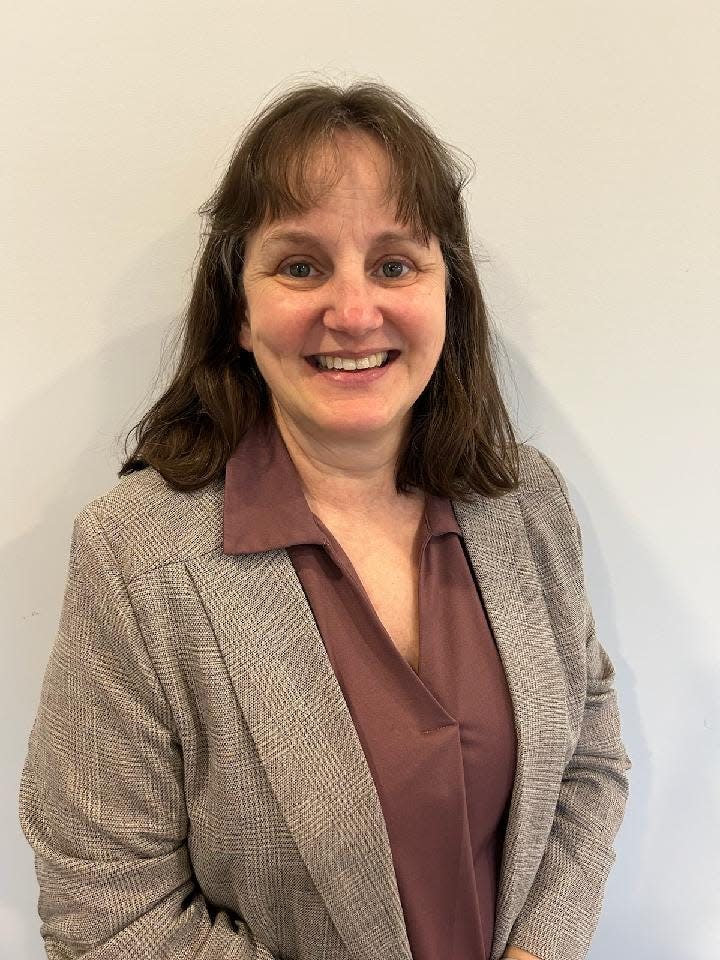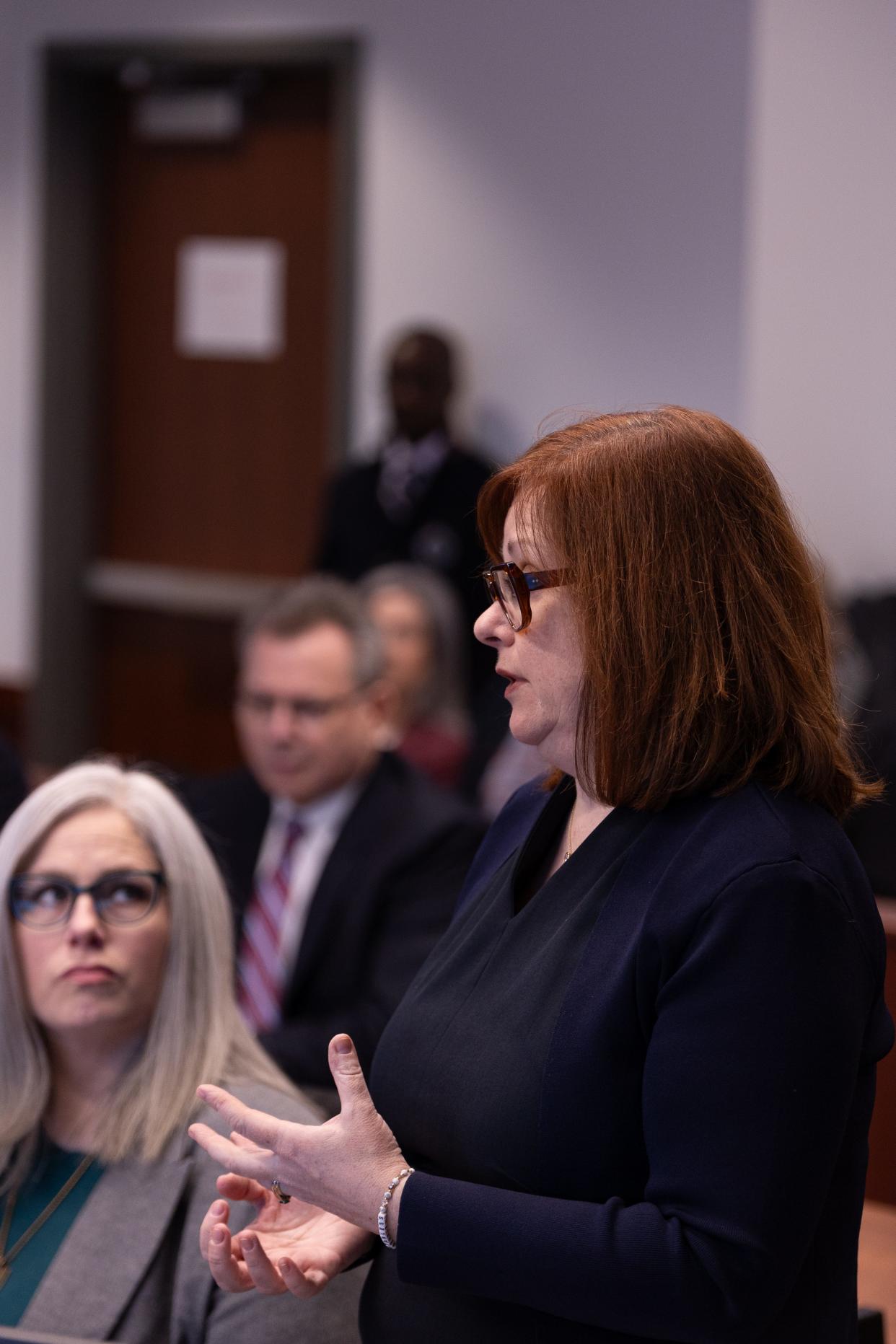Former Ottawa County employee: 'Boring' not an excuse to keep insurance meetings closed
OTTAWA COUNTY — Allegations that Ottawa Impact commissioners refuse to practice the very transparency they preached during their campaign continued Tuesday, April 9, as a former county employee accused the board of intentionally sidelining insurance authority meetings.
Dianne Fikse, of Zeeland, alleged during public comment Tuesday that Board Chair Joe Moss prevented her from making Ottawa County Insurance Authority meetings open to the public — even after a majority of the authority's members approved the move and the county's corporation counsel vetted it.

"In May of 2023, both you and (former county administrator) John Gibbs told me to keep the (meeting) closed after the Insurance Authority work group unanimously agreed to open the meeting upon the advice of this legal counsel sitting right here to my left," Fikse told Moss, gesturing to county corporation counsel Jack Jordan.
"I was told to keep the meeting closed after legal counsel told me to open it — after I spent hours working with legal counsel working on the agenda," she told Moss, adding, "Rules only apply to you when it’s convenient."
More: Ottawa Impact campaigned on transparency. In their first meeting, they blindsided the community.
Moss responded later in the meeting, saying: "Under the old leadership, the meetings for the Insurance Authority were kept closed for 35 years — closed to the public. In 2023, we went above and beyond to improve transparency and open those meetings to the public. ... Apparently, former boards and staff didn't have a problem with closed meetings for 35 years."
Fikse previously worked in the county's fiscal services department. From 2018-2023, she worked as an accounts payable supervisor and budget audit analyst for Ottawa County. She also served on the Insurance Authority's work group.

Fikse told The Sentinel when Ottawa Impact assumed a controlling majority on board, she began to wonder if the meetings should be open to the public. She watched as the far-right group pushed through a series of actions during their first official meeting of 2023 — all added to the agenda after the meeting began.
The decisions at that meeting included firing former county administrator John Shay, eliminating the county's Diversity, Equity and Inclusion Office and attempting to demote and fire the health officer.
"So I'm thinking, because I'm on the work group, why aren't the work group and the board meetings open? It should be ... so why isn't it?" she told The Sentinel.
She brought those concerns to former county corporation counsel Doug Van Essen, whom the board also fired Jan. 3, 2023. Afterward, he continued to provide litigation representation for the IA, which he helped create in the 1980s.

The IA "assumes financial and operational responsibility for all matters relating to risk retention, risk management and insurance coverage (except employee benefits) for the county, including its departments and agencies and the Ottawa County Building Authority," according to the county's website.
The building authority acquires and constructs buildings for public use and provides a funding mechanism to oversee the payment of debt for those buildings.
Van Essen said he advised Jordan that meetings haven't been open in the IA's nearly 40-year history, but they should be.
"And they were suspicious, frankly, when the issue came up, they were suspicious of me," Van Essen said. "Because I said, 'You know, no one's ever challenged it before. No one's ever asked to attend. So we never really did anything about it.' The reality is, we think it's so boring that no one would be interested in it. And we were just waiting for someone to want to attend before we would probably change our practice."

What is the IA?
Most of Michigan's 83 counties pay into the Michigan Municipal Risk Management Authority, created in 1980 so governmental entities have an insurance pool to provide liability, property and data breach coverage.
Van Essen said Ottawa County wanted to go its own way, and created the county's Housing Authority and Insurance Authority.
Genesee County also has an IA and Kent County is in the process of creating one, Van Essen said.
"In Ottawa, we like to do things on our own, so we created our own pool," he said. "We struck out on our own with $3 million."
The IA is a separate legal entity, Van Essen said, with two customers — the building authority and the county.
The IA invests money in order to keep the fund self-sustaining to cover legitimate legal claims and costs. The county continues to charge an insurance rate to all the departments as part of its annual budget.
The authority, on average, has made about 7% a year, Van Essen said.
At the end of 2023, the insurance authority had a fund balance of approximately $20 million, according to the group's March meeting.
"It's been wildly successful for Ottawa, in part because until 2022, we have had very few lawsuits," Van Essen said. "And when we have had lawsuits, we have typically won — because we didn't make great egregious mistakes.
"We haven't had a lot of liability until recently."
Transparency and Ottawa County
Van Essen said the building authority and the county — two public governmental entities — jointly created the IA. Therefore, he argues, its meetings should be open.
OMA requires public bodies to make decisions in public, with some limited exceptions for closed sessions. Any meetings involving a "quorum" of the board, the minimum number of members required to vote, must be held in public, and notice and an agenda must be provided.
Another argument for transparency? The IA is paying out taxpayer funds to cover vetted legal claims.
"All of the dollars are public," Van Essen said.
"I don't think the Open Meetings Act ever envisioned an (IA)," he said. "And some of those discussions, we don't necessarily want to be highly publicized. Now, that being said, there's no exemption for it. And the thought process was back when people were less suspicious of what was going on — when we prided ourselves on advising the public when we had something tangible.
"There was nothing nefarious. I can assure you that it wasn't like that at all — nothing we were trying to hide. That was wrong on our part."
Part of the problem was the nature of IA, covering costs related to litigation. When a lawsuit is filed against the county, the authority needs to go into closed session to consult with corporation counsel to discuss legal strategies — a legal justification to be exempted from the Open Meetings Act.
"It's mostly boring stuff — and half of it's closed to the public anyway," Van Essen said of IA meetings.
But a slew of lawsuits filed against the county — five in the past 14 months — highlights the need for heightened transparency, he said.
"The Open Meetings Act never really envisioned that you would have an (IA) that would have 10 lawsuits."
New allegations
Fikse said she verbally asked Jordan in January 2023 to provide a legal opinion on whether IA meetings should be made open to the public.
"Should this be open or not? We got crickets. Nothing. We asked again in February. Crickets. We asked again in March. Crickets. Nothing."
Fikse said the lack of response prompted her to put the issue on the agenda for the authority's work group, a subcommittee that meets monthly (the full board meets about five times each year at irregular intervals).
"I was in charge of the agenda for the work group and I just thought ... 'I'm putting it on the agenda.' So I did."
Fikse said the work group discussed the issue at its May 15, 2023, meeting. At the meeting were Finance Director Karen Karasinski, consultant Ken Bush, Fikse, Van Essen and Jordan. Gibbs attended the meeting, but left before the open meetings discussion.
"We talked about it. We all agreed. Yes. Open," she said.
After the work group meeting, Fikse said she worked with Jordan and fellow attorney Lanae Monera to create a public meeting agenda for the full board that was scheduled for the following week.
"I went back and forth with Jack. We joked about how often I walked back and forth with the printed copy ... making sure I had it right. It's engraved in my memory," she said.

After the agenda for the upcoming IA board meeting was ready to publish, Fikse sent it to county staff May 19 instructing them to post it on the county website's meeting calendar. About 20 minutes after it was posted, Moss emailed Fikse: "Please hold, I need to gain some clarity on this, I'm going to follow up shortly."
Fikse, who provided the emails to The Sentinel, said she did as Moss requested and had staff take down the meeting notice.
"That's when they told me, 'No, hold. Don't do it.' And then he went back to John. And John is the one that said, 'No, we are not making it an open meeting,'" Fikse said, referencing an email from Gibbs sent to her and Moss later that day that said the meetings would not be made open.
"Thanks for your hard work on this. We will be doing Monday's meeting in the same manner as all previous meetings, so could you please remove references to public comment and closed session," Gibbs wrote.
Gibbs told The Sentinel on Friday that he wasn't aware that Fikse had been working with Jordan to curate the agenda for the IA's planned May 22 meeting.
"The way I recall that happening is that I wanted a legal opinion before we made any changes," he said, pointing to allegations he made in a lawsuit filed this week that Jordan repeatedly would not respond to requests for legal opinions and wouldn't loop in the administrator's office on projects he worked on.

At the April 9 Board of Commissioners meeting, Jordan said he didn't recall any conversations about opening up the IA's meetings to the public — despite being present at the May work group meeting when the issue was discussed.
"I don't recall what was decided at the insurance authority meeting," he told commissioners. "I just don't. ... At this time."
In a subsequent request for comment via email, Jordan wrote April 11 that "when the question of opening the OCIA Board meetings to the public was brought to the attention of the current OCIA Board and legal counsel in mid-2023, there were discussions on the subject. Within a matter of months, the OCIA Board, with a desire for increased transparency, opened the OCIA Board meetings to the public for the first time since its inception over 30 years ago."
The IA meetings were made public in November, 11 months after Fikse's initial request for a legal opinion; the work group meetings remain closed.
In his email to The Sentinel, Jordan did not respond to questions asking why he didn't respond to Fikse's repeated requests for a legal opinion, what the justification was to remove the May meeting notice, why the meetings eventually were made open in November and why the work group meetings remain closed.
The work group has delegated authority to process claims up to $50,000 Fikse and Van Essen said.
The experience left Fikse frustrated with how things were operating at the county. She ultimately left her position in August.
But she's still bothered by the experience.
"Quite frankly, that is why I left ... and I loved that frickin job," she said. "But after that, I didn't feel valued anymore."
OMA violations are notoriously difficult to pursue
Fikse sent a complaint to the attorney general, based on her ongoing concerns that the county violated the Open Meetings Act.
Nessel's office told Fikse that "an aggrieved person may file a complaint and a request for investigation with the police or sheriff's department or State Police post in the area where the alleged OMA violation occurred."
The investigative report would then be submitted to the prosecuting attorney for the county in which the public body serves. If the county prosecuting attorney determines there is evidence of wrongdoing by the public body, the prosecutor can proceed with a civil or criminal action.
Fikse then forwarded her complaint to the Ottawa County Prosecutor's Office, where she hit another roadblock.
County Prosecutor Lee Fisher responded to Fikse, suggesting that she make a report with the sheriff's office, but that the policing agency likely wouldn't investigate the matter.
"They will assign it to the proper law enforcement agency for any potential investigation," Fisher said. "In this case, our office would not be able to make any charging decision as there would be a conflict of interest due to the Ottawa County Prosecutor’s Office being a department of county government whose funding is controlled by our Ottawa County Board of Commissioners. That is the same reason the Ottawa County Sherrif will not be able to investigate your complaint."
Fisher said prosecutors rely on investigative agencies to vet criminal complaints before charges can be substantiated and subsequently filed.
"This complaint would have to be investigated by an outside police agency, most likely the Michigan State Police. Once the investigation is completed and sent to our office for review, we would have to petition the Michigan Attorney General to request the assignment of a special prosecutor," Fisher wrote to Fikse in an April 9 email. "These cases are usually assigned by the AG to a neighboring county prosecutor’s office for the purpose of deciding whether to issue charges and then prosecute the case."

It's not the first time OMA questions have come up in Ottawa County. Following a six-week investigation after the inaugural Board of Commissioners meeting in January 2023, Nessel said the conduct of Ottawa Impact commissioners, although a “blatant violation of the public’s trust and the tenets of government transparency,” didn't technically violate state law.
More: AG: Ottawa Impact violated spirit of OMA, stronger transparency laws needed
Nessel said there's no precedent for prosecutions over Open Meetings Act violations, primarily because the law is so vague and offenses are oftentimes difficult to prove.
“Prosecutors don’t bring OMA cases — they just don’t. So, this was the first case we took as an official investigation into an OMA violation with the perspective of it potentially being a criminal act,” Nessel said.
The first time a public official intentionally violates OMA, he or she can be charged with a criminal misdemeanor and punished by a maximum fine of $1,000.
For a second offense within the same term of office, he or she can be charged with a misdemeanor and fined up to $2,000 and/or jailed for a maximum of one year.
A public official who intentionally violates the act is also personally liable for actual and exemplary damages up to $500, plus court costs and attorney fees.
As of publication, Fikse said she was considering her options in pursuing a formal investigation.
Multiple OMA violation claims since 2023
The current board has faced numerous allegations of Open Meetings Act violations even before they took office in January 2023.
The group announced in November 2022 that Moss would chair the board in 2023, even though none of the incoming commissioners had been sworn in.

In March 2023, a group of citizens sued the board and alleged that the Ottawa Impact majority violated the OMA at the Jan. 3, 2023, meeting.
The plaintiffs — four county residents — argued Ottawa Impact electees were a de facto public body subject to OMA beginning Nov. 9, 2022 — the day after the general election — because, during that period, they constituted a quorum of the board and exercised governmental authority over county employees, even though they were not yet sworn into office.
The case was dismissed by a district court judge, which also was affirmed by the state Court of Appeals. In January, the plaintiffs appealed to the Michigan Supreme Court.
The board also was accused of violating OMA in separate instances in connection with a lawsuit filed by the county health officer. Administrative Health Officer Adeline Hambley sued the board in February 2023, claiming an attempt to demote her was unlawful and alleged the Ottawa Impact majority on the board has repeatedly interfered with her state-authorized health duties.

Hambley's attorney, Sarah Riley-Howard claimed Moss called for a recess at the board's Oct. 10 meeting to essentially have a discussion "outside of the public view to deliberate and decide on whether to postpone (Hambley’s) termination hearing" and whether to renew the termination hearing charges Moss filed Sept. 27 that did not meet the requirements under state law.
Howard said the board "deliberated in a de facto quorum by using a round-robin style of communication between subquorum groups to attempt to evade the requirements of the Open Meetings Act."
Howard also said there was an OMA violation when the board voted to go into closed session on Nov. 6 to “consult with corporate counsel regarding litigation in connection with Hambley v. Ottawa County because an open meeting would have a detrimental financial effect on the litigation or settlement position of the County.”
Public bodies may only go into closed session for specific reasons listed in the OMA statute, which must be stated in open session to the public and approved by a majority vote before the closed session starts.
The Hambley lawsuit was settled in February this year, so the OMA claims were dropped as part of a settlement agreement. However, the district judge overseeing the case found that the wording Moss used when the board voted to accept the terms in November wasn't legally enforceable because it was too vague — a possible new OMA violation.
Subscribe: Receive unlimited digital access to your local news coverage
At the IA's March 2024 meeting, the authority board voted to go into closed session in relation to litigation, without identifying what lawsuit the members would discuss — another likely OMA violation.
Fikse said she has deep concerns that the practices will continue.
"I thought leaving would allow me to sleep at night," she said. "I was wrong. I still can’t sleep. I'm hoping to sleep once it’s off my chest."
— Sarah Leach is the executive editor of The Holland Sentinel. Contact her at sarahleach@hollandsentinel.com. Follow her on Twitter at @SentinelLeach.
This article originally appeared on The Holland Sentinel: Former county employee: 'Boring' no excuse to keep insurance meetings closed
